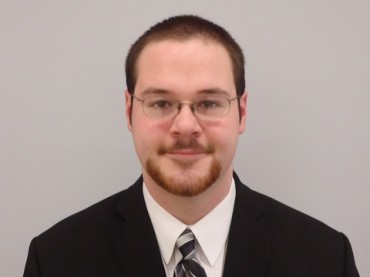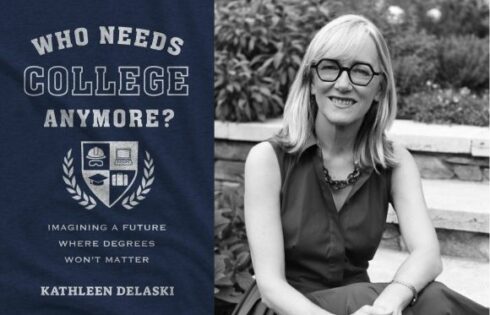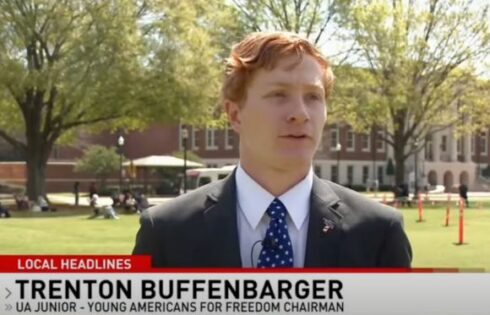
As a student journalist, I received lots of hostile feedback ranging from people calling me a “piece of s—,” to the more creative “you wouldn’t make a good pimple on a journalist’s a—hole.” But the greatest hostility I’ve experienced came my way after the publication of an opinion piece here for The College Fix about indoctrination in the College of Liberal Arts and Sciences at my alma mater, Butler University.
A political science professor used her syllabi to ask students “to write and speak in a way that does not assume American-ness, maleness, whiteness, heterosexuality, middle-class status, etc. to be the norm.” I explained that I thought being judged before the class even began and being forced to act in such a way ran against the mission of every institution of higher education.
The article soon went viral. Talk radio show hosts discussed it on air and it got picked up all across the Internet at places such as The Wall Street Journal’s “Best of the Web Today.” Then Sean Hannity did an entire segment on it for his primetime Fox News television show.
Soon thereafter, Butler University President Jim Danko sent out a campus-wide email titled “Affirming our Guiding Principles,” in which the president took care to explain that “inclusive language is encouraged and supported at Butler University.”
“Unfortunately, some responses we have received from individuals not associated with Butler University who read the article online have targeted various individuals at Butler in ways that have involved personal (verbal) attacks and hateful language,” Danko wrote. “We have taken care to ensure the safety and well being of those on our campus who have been the recipients of these responses.” Danko never contacted me, nor anyone involved in the editing or production of my article to my knowledge, to see if the hateful attacks extended in more than one direction.
Soon after Danko’s campus encyclical, I was called in for meetings with a professor, a department head, multiple college deans, and the provost of the university.
The Limbaugh Factor
Some of these meetings arose after Rush Limbaugh mentioned the story for a brief moment on his radio show. Rush may be the foulest four-letter word for some at Butler University, where people would mention his name to me in a hushed tone as if he were “He Who Must Not Be Named” from Harry Potter.
And while students and professors used his name as an obscenity, insult or punch line, his listeners reacted differently. One Butler alum and loyal Limbaugh devotee wrote the president and copied me on an email explaining that she was saddened to hear my story on his show, and relayed her own similar experience at Butler 32 years before.
“My sociology teacher at BU had called me a middle-class-brat when I wrote of my value system (work/pay/reward) growing up in southern Indiana,” the alumna wrote. “That part-time professor loudly pronounced his judgment on me in night class with his holier-than-thou reasoning, making me feel like a small freshman–I did not dare come back with a rebuttal. I was frozen. It was demeaning. … Thankfully, I had the power of perseverance and made it through the class AND pharmacy school.”
Soon after Rush discussed my story, more than 110 professors had drafted and disseminated their own critique of my work via an all-campus listerv.
“Support for such a view of education, as manifest in the criticism the professor and Butler University received in response to the piece, reminds us that we are all, professors and students alike, navigating in a challenging cultural moment, one that would define education as a commodity and dismiss efforts to establish inclusivity as “political correctness” rather than a worthy educational endeavor,” the letter explained in part.
The faculty then staged an “inclusivity teach-in” to protest my opinion and its existence on campus. I was not invited to the “inclusive” campus gathering and did not attend. According to The Butler Collegian’s Twitter feed, at least one professor called me a racist, while others questioned my character and one attendee suggested I had “plagiarized the syllabus.”
One student told me about his experience at the ‘teach-in’ without realizing I was the author of the piece in question (I waited until after he told me about his experience to let him know I was the author). The student explained that attendees at the event suggested I would “burn in hell” and “did not deserve to have any friends.” The student said he had attempted to speak out against the personal attacks against me as shameful, but was cut off by a member of the faculty.
Having learned of the planned rally just hours before it began, I decided to head to the gym—I figured it would be the last place I’d find any angry feminist professor.
Eventually the hostility directed at me seemed to subside as final exams fast approached. But as soon as the next semester began, the university continued its response to my article, even as I was off-campus completing a semester in Washington, D.C.
University Officials Double Down
As a response to my article in The College Fix, the university brought back “Founder’s Day.” The Founder’s Day event took place at the on-campus Starbucks and included readings of the Emancipation Proclamation, a speech by Frederick Douglass, and other speeches, according to The Butler Collegian. An associate professor told The Collegian such action was necessary because “the school needs a reminder of its values following the article written by Ryan Lovelace last year for The College Fix.”
But the Founder’s Day event did not conclude Butler’s response to my article. Instead, Butler continued to reward those who openly attacked me and my point of view. The College of Liberal Arts and Sciences awarded a $1,000 prize to a student who entered the LAS essay contest writing against my work. The contest asked students to respond to the prompt, “Primed to Serve, a Benefit of a Liberal Arts Education,” and the winning student submitted an entry titled, “Bologna and Blogs: A Student’s Journey Towards Actualizing The Purpose of His Higher Education.” In the essay, the student framed the situation surrounding my article as “A professor in the College of Liberal Arts and Sciences came under attack by a student.”
This student’s opinion was hardly new. Butler University’s website housed multiple blog posts by the same student about the situation titled, “Fixing College?” and “Fix College: The Real Problem is the Student.” The College Fix’s editor responded to the Butler University blog posts here.
While the university sponsored, rewarded, hosted and promoted content and programming that viewed my existence and thinking as reprehensible, I decided not to respond fearing retribution. The College Fix defended my article and helped me evaluate the situation, while some professors, students and friends at Butler advocated on behalf of allowing me to continue as a student at Butler. I am grateful for all of the support that I know allowed me to continue pursuing my college degree.Having graduated in May, I now feel comfortable explaining that my article was not written or meant as an ad hominem attack on any course, professor, or syllabus. Instead, my critique was directed at the Liberal Arts experience I encountered at Butler University.
I could have written about many other classes. A Spanish class I took screened a film portraying Che Guevara, the Marxist revolutionary, as a young man who fought to help the sick and impoverished. While the rest of the class did not appear to share my reaction of disgust, I suspect a similar film romanticizing Adolf Hitler’s life as a struggling painter in a German language class would have elicited a stronger reaction against such vile propaganda.
In another class, a professor called me into his office because he was displeased that I submitted a homework assignment that did not share his beliefs and concern for the trees being chopped down in the Amazon. He proceeded to lecture me for half an hour about why the class materials he selected were unbiased.
And I could continue with several other examples, but I chose to highlight the syllabus of a political science class in my article because it was a concrete example of bias in the Liberal Arts curriculum that could not be brushed off as an isolated anecdote or hearsay.
Standing Firm
I had hoped my article would encourage decision-makers on campus to consider the values of “inclusivity” and “diversity” as less about race, sexuality, and identity and more about welcoming contrasting points of view. I hoped Butler would listen to students with differing opinions and present multiple ways of thinking in the classroom without first evaluating students’ ethnicity or socio-economic background. This never happened at Butler. But it happens every day at The College Fix, where students offer opinions and uncover stories that campuses are unwilling, or else unable, to consider and cover.
Despite a few ups and downs, I enjoyed my time at Butler University and will always love being a Bulldog. Ultimately, I benefited from attending Butler—where I learned to speak up for my beliefs, even when those beliefs were unpopular—and I hope others will benefit even more so. I hold out hope that Butler will improve because I know many friends, teachers, and parents who have a vested interest in making Butler a better place to learn.
Ryan Lovelace is a 2014 graduate of Butler University. He was a 2013 College Fix Summer Fellow, and has recently been named the William F. Buckley Jr. Fellow in Political Journalism at National Review Institute.
Click here to “Like” The College Fix on Facebook / Follow us on Twitter @collegefix





Please join the conversation about our stories on Facebook, Twitter, Instagram, Reddit, MeWe, Rumble, Gab, Minds and Gettr.